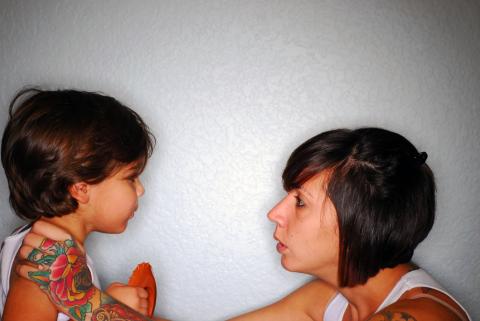
Photo credit: Chocolate Milk Photography
Methods and Techniques for Discipling Young Children
1. What is most important when we think about disciplining our kids?
- Prevention is essential for children under five.
- Make sure that they are well fed and well rested. Hunger and sleepiness cause bad behavior in children.
- Maintain a strict routine. A routine helps children anticipate what is going to happen and when it is going to happen in their daily lives. This creates security and autonomy, which reduce bad behavior in children.
2. What is the best method for disciplining our kids?
- Always focus first on their goal/objective and their emotional state before establishing a boundary. It is best to lower yourself to the child’s level and in the most tranquil form possible describe what the child is feeling, what you expect of them and express that you are certain that next time, they will do it properly.
- Take into account if you are putting the child in receptive state or a reactive state. Shouting scares children and causes them to go into a reactive state; their brains make them respond as if responding to danger, by fighting, fleeing or freezing.
- Respond quickly. Many parents repeat what they want the kid to do, too many times. It is best to:
1. First, express the pattern of behavior or rule you want followed, once.
2. Second, approach the child and repeat it.
3. Third, help them by moving them or touching them so that they can follow the behavior/rule
Always respond with the rule or limit that has been established, consistently.
3. What is normal for young kids, under five, in regards to following the rules?
- They play with the rules and repeat them. They will scold their toys or repeat what they have been told and in this way they understand the boundaries.
- Children under three years old cannot control their impulses. That is why they break the rules as often as they do.
- Children under four have three tantrums an hour and one conflict every three minutes with their caretakers. That is the norm and because of this parents of young children feel as if they are always in conflict.
- Children over four understand rules and begin to integrate them as part of their personality. However, most are not able to control their impulses, and when they can, they only can do it 40% of the time or less. That is why they continue to break the rules, and why it is so important to be consistent in your response.
4. Finally, what do we know about spanking, which many continue to affirm as an effective way to discipline and to avoid spoiling our children. Is it a good method?
Research shows that physical discipline has negative results in children and this is well known among those who work with children. One research study confirmed that corporal punishment had negative results in adolescents, for example, low academic achievement, alcoholism, drug use, and antisocial behavior. They also discovered that the older the child is, the worse the outcomes.
From a more practical point of view, we have to consider what it is we are teaching them when we spank them or we slap them on the hands so that they stop touching something. This teaches them that when you don’t like what they are doing or when you are angry with them, you should/will hit them. Then, the child, when he gets angry with his friend or when a friend takes something from him, he ends up hitting them.



The views and opinions expressed in this post are those of the author(s) and do not necessarily reflect those of MomsRising.org.
MomsRising.org strongly encourages our readers to post comments in response to blog posts. We value diversity of opinions and perspectives. Our goals for this space are to be educational, thought-provoking, and respectful. So we actively moderate comments and we reserve the right to edit or remove comments that undermine these goals. Thanks!